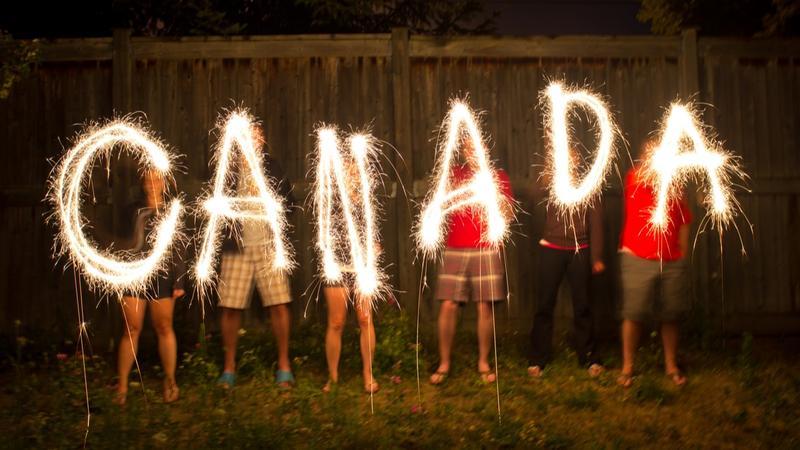With the usual large-scale Canada Day celebrations going virtual this year, most Canadians will be celebrating at home. But if you’ve decided to be responsible for your fireworks fix, you need to know the risks and understand your liability.
If you decide you’d like to light up the sky from your backyard, there are essential safety measures you must take. The proper precautions will avoid any accidents and potential litigation from a neighbour. You also need to make sure you have the right home insurance coverage in case something does go wrong.
Know Your Fireworks
Not all fireworks are created equal. The ones you’re allowed to set off in your backyard are different from those you see at major celebrations.
Different kinds of fireworks require different kinds of certificates; there are three classes. You must be certified by Natural Resources Canada to handle display fireworks or special effect pyrotechnics. What you are permitted to use in your backyard are consumer fireworks. They are low-hazard and designed for recreational use, and include sparklers, fountains, volcanoes, mines, snakes, and Roman candles.
You don’t need a certificate to use consumer fireworks, but be sure to check for any provincial or municipal guidelines for fireworks use you where you live. You should always make certain you buy your fireworks from a reliable source. They’re not safe unless they’ve come from someone who knows how to make them.
Keep Safety Top-of-Mind
Lighting up the night with fireworks in your backyard might sound like a fun thing to do. But it should be taken as seriously as a professionally organized celebration, no matter the size of the gathering.
Just as a small number of people are responsible for setting off the fireworks at a county fair or larger Canada Day celebration, your backyard endeavour should appoint a reliable person to be in charge, and limit who can handle and discharge fireworks. They all should be adults who clearly understand the hazards involved and the necessary essential safety precautions.
Anyone with long hair should tie it up while handling fireworks. It should go without saying that people who are impaired by either alcohol or drugs shouldn’t handle them, and no one should smoke near them, either.
Everyone responsible for handling and setting off the fireworks should carefully read and follow the label directions on the packaging. Any fireworks should be discharged well away from combustible materials, including trees, dry grass, stacked firewood and buildings. Even with these precautions, you should always keep a bucket of water or water hose nearby when setting off fireworks.
It’s tempting to copy the bigger fireworks displays you see at public events, but you should only discharge one firework at a time in your backyard. Make sure they’re all on the ground too — never try to light a firework in your hand. You’ll probably have a few duds as well. If you do, don’t attempt to relight them if they don’t light up the first time. Instead, wait for a half-hour, soak them in a pail of water, and dispose of them in a metal container.
Lighting Fireworks Always Poses Risks
No matter how careful you are with fireworks, there’s always a chance something may go wrong.
That’s why should you always keep sparklers away from children — they burn extremely hot and can ignite clothing, cause blindness, and lead to severe burns. To avoid injury, always soak a sparkler wire in water to after burnout, as it will remain hot for several minutes.
It’s not just children you should be concerned about — fireworks can spook your pets. Ideally, you’ll want to keep them indoors, but if they must be outside with you, use a leash or carrier at all times so they won’t run off. Be sure any pet identification tag on the animal’s collar is current if they do manage to run away.
You should also take into consideration the weather before setting off your fireworks. Wind conditions, in particular, can create unacceptable safety hazards.
If someone does suffer a burn, run cool water over the wound for three to five minutes, and seek medical attention if necessary. Any incidents involving fireworks should be reported to Natural Resources Canada.
Do You Have Enough Liability Coverage?
Fireworks are highly dangerous explosives.
Besides injuries to family, friends and neighbours that could lead to legal action, there’s also the potential for property damage. Home insurance liability coverage is the best way to guarantee yourself financial protection, and you should always check to see if you have the right homeowner’s insurance before putting on your backyard fireworks.
A firework flare aimed in the wrong direction could have serious consequences — as severe a setting your house on fire. Your homeowner’s insurance policy may cover this type of damage, but double-check before organizing your backyard light show.
An off-course firework can also damage your neighbour’s home or other nearby structures. That neighbour or property owner could sue for damages, which is where your third-party liability coverage comes into play. Third-party liability coverage is usually included in your homeowner or condo insurance policy, but there are limits to that coverage. Have a chat with your broker or insurer to confirm with you have enough coverage.
Also remember that even if you have the right insurance coverage, it’s null and void if your province or municipality bans backyard fireworks because it’s considered an illegal activity.
